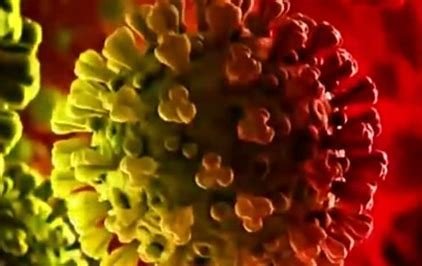Novavax Announces Initial Omicron Cross-Reactivity Data from COVID-19 Vaccine Booster
23 December 2021 | Thursday | News

Image Source : Public Domain
Third dose produced increased immune responses comparable to or exceeding levels associated with protection in Phase 3 clinical trials, with a 9.3-fold IgG rise and a 19.9-fold ACE2 inhibition increase after booster dose
- Immune responses in adolescents were 2- to 4-fold higher than adults against broad array of variants of interest and variants of concern
- Development of Omicron-specific vaccine on track for initiation of GMP manufacturing in early January
Novavax, Inc. (Nasdaq: NVAX), a biotechnology company dedicated to developing and commercializing next-generation vaccines for serious infectious diseases, today announced initial data evaluating the immune response of its COVID-19 vaccine, NVX-CoV2373, against the Omicron variant as well as additional data from its ongoing Phase 2 boost study. New results demonstrate broad cross-reactivity against Omicron and other circulating variants from a primary 2-dose regimen, with responses that increased following a third dose at six months.
Immune responses included the following:
- Anti-spike IgG titers after Dose 3 increased 5.4-fold (prototype) to 9.3-fold (Omicron) from peak responses seen after 2-dose primary vaccination.
- This represents a 61.1-fold (prototype) and a 73.5-fold (Omicron) increase from prior to the Dose 3 boost.
- ACE2-inhibition titers increased 6-fold (prototype) to 19.9-fold (Omicron) compared to peak responses following 2-dose primary series, representing a 54.4-fold (prototype), a 24.4-fold (Delta) and a 36.3-fold (Omicron) increase from prior to the booster.
- Wild-type neutralization responses were observed after 2 doses for prototype, Delta and Omicron. Significant increases were observed after boosting, with titers for Delta and Omicron comparable to levels associated with protection in U.S. and Mexico and U.K. Phase 3 studies.
- After 2 doses, Omicron wild-type neutralization was <4-fold lower than prototype, suggesting that both a booster dose as well as an Omicron-specific vaccine may be beneficial.
Further, data from the pediatric expansion of Novavax' PREVENT-19 Phase 3 trial in the U.S. and Mexico showed robust immune responses in adolescents, including increased IgG and receptor inhibition titers against a wide array of variants, including Omicron, following a 2-dose series. Responses in adolescents were 2- to 4-fold higher than adults against all evaluated variants.
"In the midst of an evolving pandemic, NVX-CoV2373 showed strong immune responses against Omicron and other circulating variants. We are encouraged that boosted responses against all variants were comparable to those associated with high vaccine efficacy in our Phase 3 clinical trials, suggesting that NVX-CoV2373 can play an important role in the ongoing fight against new variants," said Gregory M. Glenn, President of Research and Development, Novavax. "Given the continued evolution of the coronavirus, the development of an Omicron vaccine could be necessary. Novavax has cloned, expressed and characterized the Omicron spike protein vaccine and will soon enter the GMP-phase of production. We expect to begin clinical studies in the first quarter of 2022."
As part of an ongoing study, a single booster dose of 5 µg SARS-CoV-2 rS with 50 µg Matrix-M™ adjuvant was administered to healthy adult participants approximately six months after their primary 2-dose vaccination series. Multiple assays were used to evaluate immune responses against SARS-CoV-2 twenty-eight days following the booster dose.
Safety reporting of reactogenicity events showed an increasing trend across all 3 doses of NVX-CoV2373, reflecting the increased immunogenicity seen with a third dose. Following the booster, local and systemic reactions were generally short-lived with a median duration of approximately 2 days. The incidence of Grade 3 or higher events remained relatively low. Medically attended adverse events (MAAEs), potentially immune-mediated medical conditions (PIMMCs), and severe adverse events (SAEs) occurred infrequently following the booster dose and were balanced between vaccine and placebo groups.
The major findings, detailed in 'Immunogenicity and Safety Following a Homologous Booster Dose of a SARS-CoV-2 recombinant spike protein vaccine (NVX-CoV2373): A Phase 2 Randomized Placebo-Controlled Trial,' will be submitted for peer-review publication and are expected to be available online at https://www.medrxiv.org/ in the coming days.
Most Read
- Innovations In Magnetic Resonance Imaging Introduced By United Imaging
- Management of Relapsed/Refractory Multiple Myeloma
- 2025 Drug Approvals, Decoded: What Every Biopharma Leader Needs to Know
- BioPharma Manufacturing Resilience: Lessons From Capacity Expansion and Supply Chain Resets from 2025
- APAC Biopharma Review 2025: Innovation, Investment, and Influence on the Global Stage
- Top 25 Biotech Innovations Redefining Health And Planet In 2025
- How Health Systems Are Reshaping Drug Adoption, Partner Models, and Market Access in 2026
- The New AI Gold Rush: Western Pharma’s Billion-Dollar Bet on Chinese Biotech
- Single-Use Systems Are Rewiring Biopharma Manufacturing
- The State of Biotech and Life Science Jobs in Asia Pacific – 2025
- Asia-Pacific Leads the Charge: Latest Global BioSupplier Technologies of 2025
- Invisible Threats, Visible Risks: How the Nitrosamine Crisis Reshaped Asia’s Pharmaceutical Quality Landscape
Bio Jobs
- Sanofi Turns The Page As Belén Garijo Steps In And Paul Hudson Steps Out
- Global Survey Reveals Nearly 40% of Employees Facing Fertility Challenges Consider Leaving Their Jobs
- BioMed X and AbbVie Begin Global Search for Bold Neuroscience Talent To Decode the Biology of Anhedonia
- Thermo Fisher Expands Bengaluru R&D Centre to Advance Antibody Innovation and Strengthen India’s Life Sciences Ecosystem
- Accord Plasma (Intas Group) Acquires Prothya Biosolutions to Expand Global Plasma Capabilities
- ACG Announces $200 Million Investment to Establish First U.S. Capsule Manufacturing Facility in Atlanta
- AstraZeneca Invests $4.5 Billion to Build Advanced Manufacturing Facility in Virginia, Expanding U.S. Medicine Production
News











